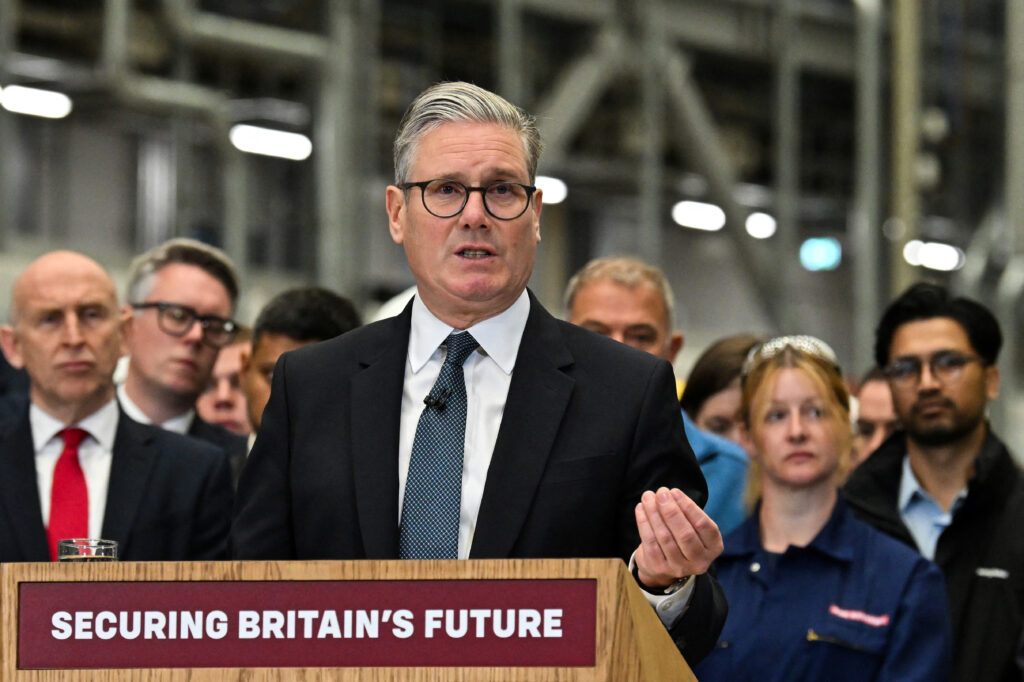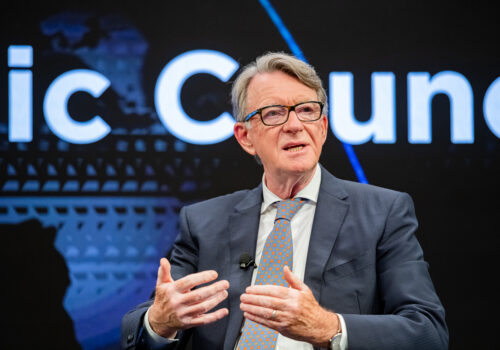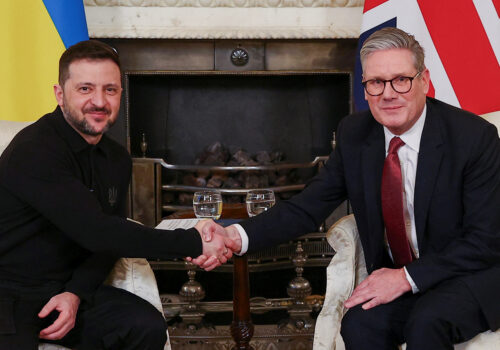By publishing its long-awaited Strategic Defence Review (SDR) on Monday, the United Kingdom has taken a positive step toward the reinvigoration and reform of its defense posture. Recognizing the perilous nature of the geostrategic scene, drawing lessons from the war in Ukraine, and seeking to enhance its leading role in NATO, the review is rigorous, thoughtful, and compelling; it offers one of the more realistic assessments of the United Kingdom’s security posture in recent memory. Its success, however, will hinge on funding and follow-through.
The SDR was written independently by Lord George Robertson, a former UK defense secretary and NATO secretary general; General Sir Richard Barrons, a former commander of the UK Joint Forces Command; and Fiona Hill, a foreign policy expert and former senior director for Europe and Russia at the US National Security Council. It benefits from the authors’ deep expertise and freedom to speak frankly.
In my assessment as a former Royal Air Force senior officer and director general of the NATO headquarters International Military Staff, I find the review blunt and refreshingly free of political gloss while still being infused with strategic depth. It offers a sobering analysis of the threats Britain faces and a coherent and comprehensive plan to deal with them.
If the UK media coverage of the review is anything to go by, then it has already been successful in promoting a national debate on the severity of the strategic risks the United Kingdom and its allies face. One of the review’s core aims is to foster a “total defence” culture, an understanding that security is not the sole preserve of the armed forces but a collective national responsibility.
No more “hollowing out”
British Prime Minister Keir Starmer echoed this whole-of-society message in a speech he delivered in Glasgow on Monday to launch the SDR. In the speech, he warned that the United Kingdom must prepare for a dangerous decade ahead. The United Kingdom would become, he said, “a battle-ready, armor-clad nation, with the strongest alliances and the most advanced capabilities, equipped for the decades to come.” Indeed, the review is laced throughout with the concept of “NATO first” and the United Kingdom’s aspiration to play a leading role in the Alliance.
On capabilities, the review outlines a serious agenda for restoring UK military strength after years of “hollowing out.” Among the most significant commitments is the acceleration of the United Kingdom’s sovereign nuclear warhead program (at a cost of £15 billion) to ensure that the country maintains an independent and credible deterrent. This is paired with equally serious investment in conventional capabilities, including the commitments to produce seven thousand long-range and cruise missiles and to construct six new munitions factories.
The SDR further calls for the United Kingdom to become a leading technology-enabled defense power, with an integrated force that deters, fights, and wins through constant innovation at wartime pace. To achieve that, it proposes a “three Is” model: integrated (rather than joint) forces, which are innovation-led and backed by industry. It emphasizes that greater attention must be given to the space, cyber, and electromagnetic domains. It also proposes making the army ten times more lethal by 2035 by exploiting autonomous systems and a “digital targeting web,” all informed by lessons learned from the ongoing conflict in Ukraine.
The government has also pledged £1.5 billion for the modernization and refurbishment of military living accommodations. This, together with a move to take a whole-force, skills-based approach to workforce planning, would constitute long-overdue investments that could begin to address the current crisis surrounding the recruitment and retention of personnel.
None of the review’s recommendations reflect a marginal upgrade. Striking the appropriate balance between mass, speed, and resilience has returned to relevance alongside the need to reinvigorate stockpiles, munitions manufacturing, autonomous systems, and the United Kingdom’s technological edge. As demonstrated by the war in Ukraine, all these factors will increasingly define combat effectiveness. The SDR further recognizes the need to radically transform defense procurement processes and practice. For Britain to remain a serious military power, addressing these issues is both overdue and essential.
Finding the funding
Crucially, all sixty-two of the SDR’s recommendations have been accepted by the UK government—an indication, at least on paper, of genuine resolve.
And yet, despite the soundness of the review and the seriousness of its ambitions, an inevitable question mark remains over how these recommendations will be funded.
The government’s pledge to raise defense spending to 2.5 percent of gross domestic product (GDP) by 2027 is a step in the right direction. This review is unique in recent British history for being accompanied by increases rather than cuts in the budget. But this is still only a step. The longer-term ambition to reach 3 percent of GDP is not backed by binding Treasury policy or formal financial commitment. Moreover, it seems to hinge on a “defence dividend” of economic growth from a revitalized defense industrial base. Such an aspiration is not enough. In the face of a deteriorating strategic environment, Alliance members are likely to demand a minimum of 3.5 percent of GDP expenditure on defense at the upcoming NATO Summit in The Hague, which could lead to the United Kingdom falling behind the level of spending expected of a leading NATO power. Effective deterrence depends on credibility—and credibility hinges not on promises but on funded and delivered capabilities.
This financial dimension is especially critical in light of shifting US priorities. While the United States is unlikely to totally withdraw from NATO, there is a looming sense that Washington’s focus is inexorably moving away from Europe and toward the Indo-Pacific. Successive US administrations—regardless of party—have made clear that they expect European allies to carry more of the burden for their own defense. This has been brought into stark relief by the current US administration. A more self-reliant and militarily capable Europe is, therefore, no longer a theoretical objective—it is a strategic necessity.
For Britain, this means more than incremental increases in spending. It means making hard political choices and long-term industrial commitments now. The SDR lays out what needs to be done. The government has signaled its agreement. The next step—the most important one—will be putting money behind this critical endeavor.
Air Marshal Sir Christopher Harper is a nonresident senior fellow with the Atlantic Council’s Transatlantic Security Initiative in the Scowcroft Center for Strategy and Security. He previously served in the Royal Air Force, including as the UK military representative to NATO and the EU in Brussels and as director general of the NATO headquarters International Military Staff.
Further reading
Tue, May 27, 2025
British ambassador to the US: The UK must ‘become less dependent on America, while remaining inseparably linked’
New Atlanticist By
In speaking at the Atlantic Council's 2025 Christopher J. Makins Lecture, Peter Mandelson outlined how the United Kingdom and the rest of Europe can foster peace through military, economic, and technological strength.
Tue, Mar 18, 2025
Britain takes the lead as Europe seeks to boost support for Ukraine
UkraineAlert By
With the future of US support for Ukraine in doubt, Britain is leading European efforts to bolster the Ukrainian war effort and deny Putin an historic victory that would place the whole of Europe in peril, writes Alina Hrytsenko.
Tue, Jan 7, 2025
What the new British ambassador to the US means for the ‘special relationship’
New Atlanticist By
The new envoy to Washington is a politician, not a career diplomat. That might be just what the US-UK relationship needs at this moment.
Image: Britain's Prime Minister Keir Starmer delivers a speech during a visit to the BAE Systems' Govan facility, in Glasgow, Scotland, Britain, June 2, 2025. Andy Buchanan/Pool via REUTERS.




